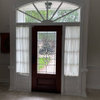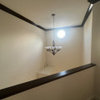Optometrist or Opthalmologist?
Olychick
10 years ago
Sponsored
Most Skilled Home Improvement Specialists in Franklin County
More Discussions
I wear glasses and need an exam and new prescription...probably been 6 or 7 years since I saw an eye doc. I'm a baby about having my eyes messed with, so I avoid it as long as possible, but need new glasses, I can tell. I've been going to a female ophthalmologist who specializes in children, because I want to act like a 2 year old; she's very kind, but has move to a town about 1.5 hrs away - doable, but I'm thinking of trying someone new.
I don't have vision insurance since retiring, but can afford to pay for my visits out of pocket. I'm wondering if I need to see an ophthalmologist (no disease that I know of, but a history of macular degeneration in my family) or is an optometrist adequate. What say you? Which do you see (no pun intended)?




Annie Deighnaugh
Vertise
Related Professionals
Sweetwater Interior Designers & Decorators · Camarillo Furniture & Accessories · Fort Wayne Furniture & Accessories · Kearny Furniture & Accessories · Minneapolis Furniture & Accessories · Tucson Furniture & Accessories · Holliston Furniture & Accessories · Springville Custom Artists · Orcutt Lighting · Brenham Window Treatments · East Setauket Window Treatments · Riverside Window Treatments · Stanton Window Treatments · Sun Lakes Window Treatments · Westfield Window Treatmentsjoaniepoanie
anele_gw
awm03
golddust
ellendi
OlychickOriginal Author
tuesday_2008
Vertise
3katz4me
tinam61
OlychickOriginal Author
User
leel
gsciencechick
leel
Happyladi
covingtoncat
Vertise
OlychickOriginal Author